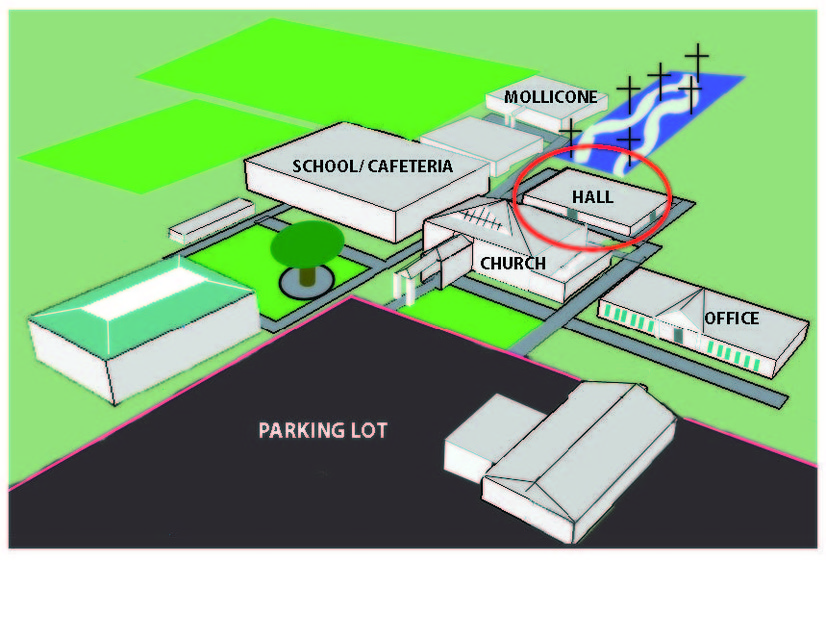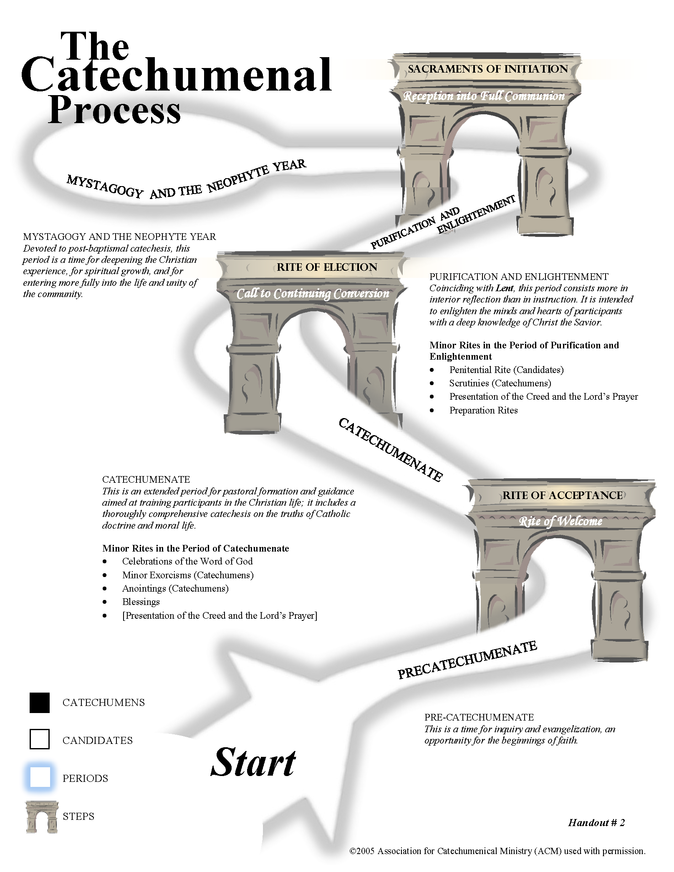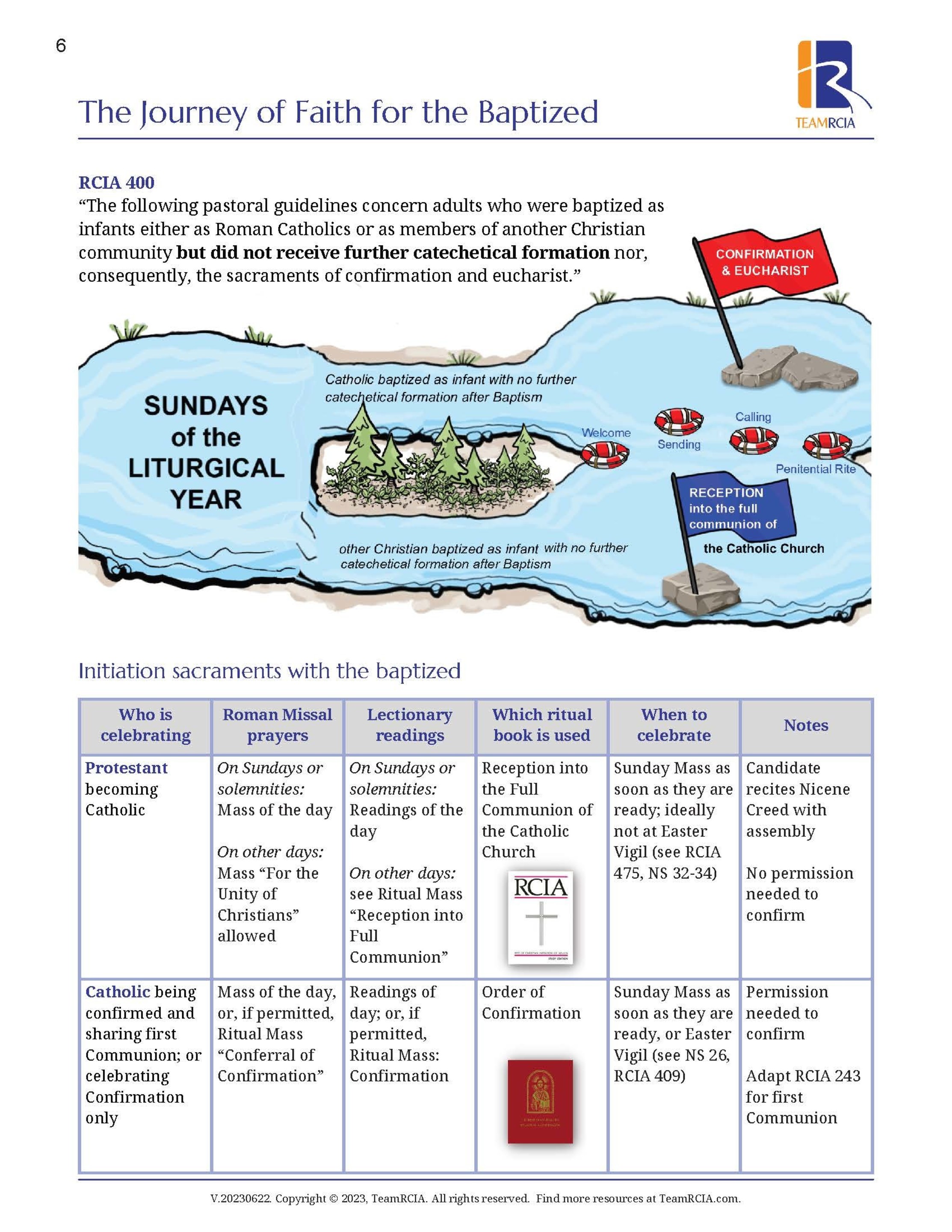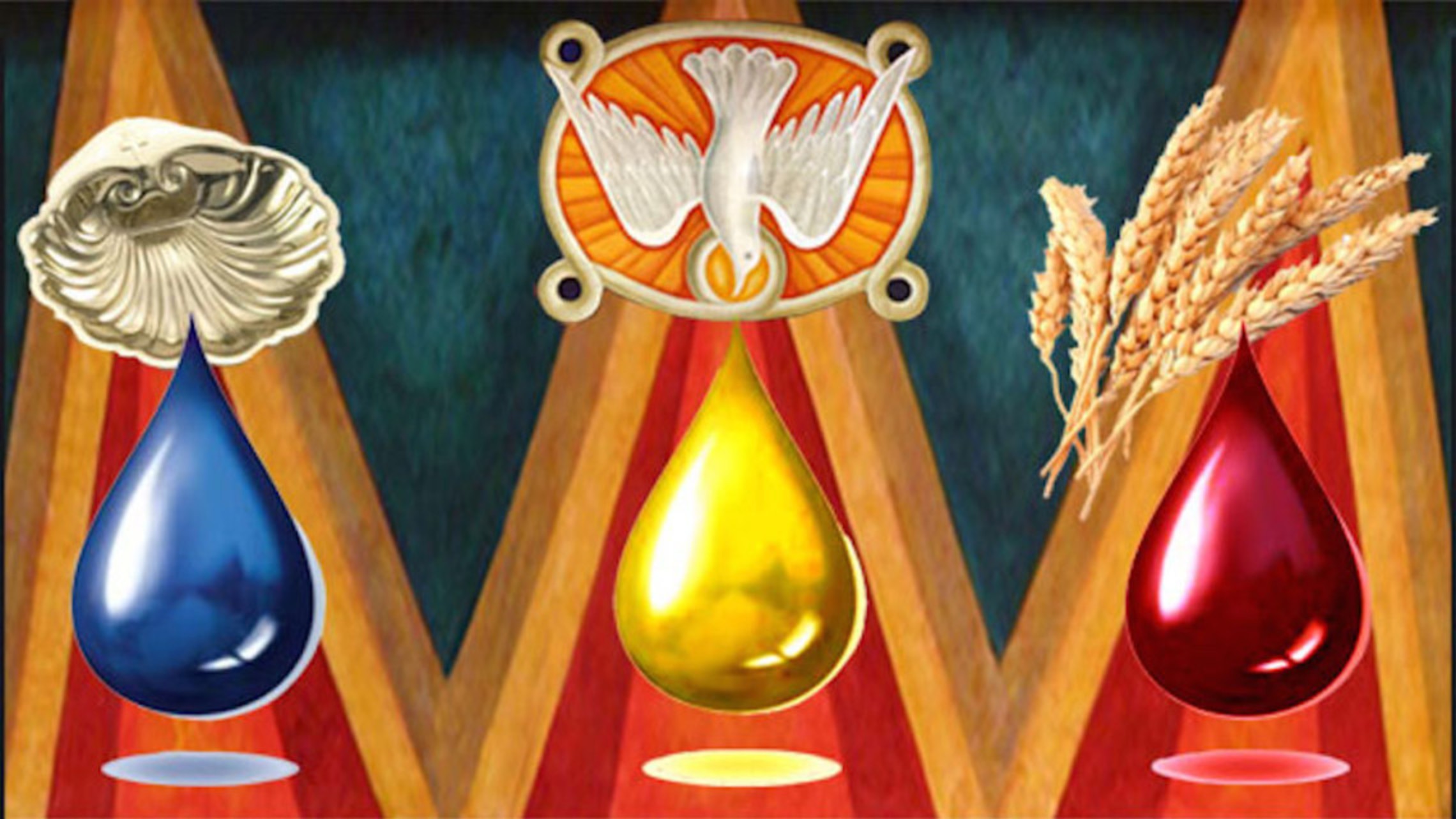It is Jesus that you seek when you dream of happiness; He is waiting for you when nothing else you find satisfies you. He is the beauty to which you are so attracted; it is he who provoked you that thirst for fullness that will not let you settle for compromise; it is He who urges you to shed the masks of a false life; it is he who reads in your heart your most genuine choices, the choices that others try to stifle
St. John Paul II
Learn about the Christian Initiation for Process
The Christian Initiation of is the Church's ritual process for calling not already baptized individuals over the age of 7 to a conversion of mind and heart and preparing them to grow in relationship with Jesus Christ, and—if they desire—become members of the Catholic Church through Baptism, Confirmation, and Holy Communion. and to enter into a full and active life in the Church as disciples of Jesus.
The process of becoming a mature Christian involves more than just learning about the faith of the Church. Becoming a Christian presumes a relationship with God who becomes the ground of our being. To be a Christian means that we have claimed the values of the Gospel as our own and have committed ourselves to the teaching of Jesus.
Unlike our usual understanding and ritual that takes place at a specific moment, the Initation process is spread over a longer duration. The Initiation process aims to transform the entire person into an individual who has truly put on Christ Jesus. Obviously, this kind of conversion of the whole person takes sufficient time to mature.
-
Unbaptized adults seeking to receive the sacraments of Baptism, Confirmation and Eucharist (Holy Communion)
-
The Christian Initiation Adapted for Children is the process for youth & adolescents over the age of 7 and under 18 who have not yet been baptized or teens who have are baptized Catholic and not received First Communion
-
Baptized adults from another Christian tradition who wish to become (received into) members of the Catholic Church
-
Adults who were baptized in the Catholic church at a young age, but not formed in the faith and who now wish to complete the sacraments of Initiation by receiving the sacraments of Confirmation and Eucharist.
What is the Journey if already baptized?
Christian Initiation Phases
The Christian Initiation is comprised of Phases and Steps. These follow the experience of conversion to and initiation in the Christian faith.
Inquiry Phase (Pre-Catechumenate)
A time of asking questions and freely exploring the faith. No fixed length—this stage depends on your needs and readiness.
Ritual Step: Entrance into the Catechumenate (un-baptized) and Rite of Welcoming (baptized) for those that have indicated, and given evidence of conversion, and desire to follow the way of Christ through the Catholic Church.
Catechumenate Phase
This phase is the apprenticeship towards Christian discipleship. It is accomplished through formal instruction in the core teachings and beliefs (doctrine) of the faith and experienced through liturgy, service, and parish community life. This comprehensive approach aims for a thorough integration of the faith. The Catechumenate follows the liturgical cycle of the Church since that is how the faith is experienced in daily life.
Duration: The Catechumenate lasts at least one full year, giving you time to experience the Church’s liturgical seasons and grow steadily in faith.
Ritual Step: Rite of Election for the un-baptized who have given clear evidence of acquaintance and integration of the core teachings and beliefs and desire to accept baptism. Call to Continuing Conversion for the baptized who also demonstrate acquaintance and integration of the core teachings and beliefs and desire to complete their initiation, or come into full communion with the Catholic Church.
Purification and Enlightenment Phase (Lent)
It is no longer a time to "learn teachings that were not picked up" - those must be completed fully prior to beginning this phase. In this phase, indicated by its name points to an intense, inward reflection and discernment, the community prays for you in ceremonies called the Scrutinies, helping you deepen your readiness for the Sacraments. Additionally, the candidate seeks to be purified in their intentions to follow Christ more fully, to recognize any sinful attachments or attitudes that still separate or diminish their relationship with Christ, and to receive the light they need to follow him more authentically.
Ritual Step: Sacraments of Initiation (Easter Vigil) - Baptism, Confirmation, First Holy Communion for the un-baptized.
Mystagogy Phase:
It is said that all of the baptized faithful are continuing this phase because we are still reflecting on the story of Christ, and still experiencing the conversion from our Christian initiation, regardless of when that occurred. The Mystagogia, strictly speaking, occurs for the neophytes and newly professed members for the period between Easter and Pentecost. Some experts propose a year-long mystagogia. The mystagogia period is similar to the story of walk along the road Emmaus. The disciples were so excited and filled with wonder telling the story of Jesus' life, death, and resurrection that they did not recognize it was Christ to whom they were sp
Neophyte Year
From your Baptism at Easter until its first anniversary, you are called a neophyte (“newly planted”).
During this year, you continue to receive support, formation, and encouragement from the Church as you grow in living the Catholic life.
The parish community prays with you and walks alongside you as you take your first steps as a fully initiated Catholic.
REQUIREMENTS FOR GODPARENTS
- Must be at least 16 years of age.
- At least one godparent is needed; a fully initiated (having received Baptism, First Communion and Confirmation), practicing Catholic, registered in a parish. There may be two godparents, one man and one woman; both must be fully initiated practicing Catholics. If they are not members of this parish they must obtain a letter of Good Standing from their home parish. As long as there is one godparent who is a fully initiated practicing Catholic, a baptized practicing non-Catholic Christian can be designated as a Christian Witness to the baptism. In this case, a letter from the Christian Witness’s pastor is necessary, stating that they are in good standing in his or her church.
- Must be someone other than the parents of the child to be baptized.
- Must be leading a life in harmony with the Catholic faith and the role they are about to assume.
- Godparents can be represented by a proxy if unable to attend the ceremony.
Certificate to Serve as a Godparent (English)
Certificado para servir como padrino (español)
START HERE
Next Steps:
If not already done:
- Complete online webform “Christian Initiation Interest”
- Also, fill out an Adult Christian Initiation Registration Form (English) or (Español) and email back to [email protected]
- Provide a copy of birth certificate and email back to [email protected]
- Subscribe to Formed.org (Instructions)
- Download and install Ascension Press Bible & Catechism App (Free)
- Read the Gospel of Mark (two chapters each day)
- Download and install the Amen App (Free)
- Download and install Hallow App (Free)
- Download and install the MyParish App
- Download and install the ChosenTV App (Free)
Contact our Christian Initiation Coordinator at [email protected] with additional questions.
Seeker/Inquiry Sessions
Monday's 6:30 pm to 8:00 pm
Parish Hall, Bauman Room (Excluding Holiday's)

Are you an adult seeking to receive the Sacrament of Confirmation?
Congratulations! Through this Sacrament your life in the Spirit will be strengthen and enriched! The Archdiocese provides several opportunities per year for adult Catholics (18+) to receive the sacrament of Confirmation. Because this sacrament is so intimately united to the sacraments of Baptism and Eucharist, persons wishing to be confirmed must:
• Have been baptized Catholic
• Have already received their first Eucharist as a Catholic
• Have been through a process of formation to receive the sacrament of Confirmation







